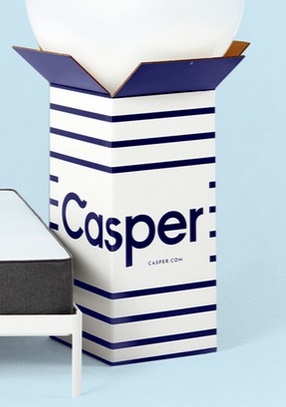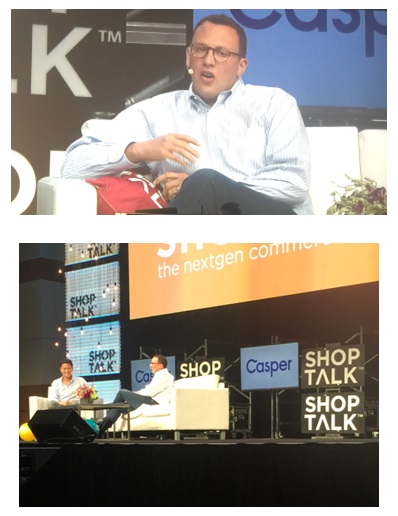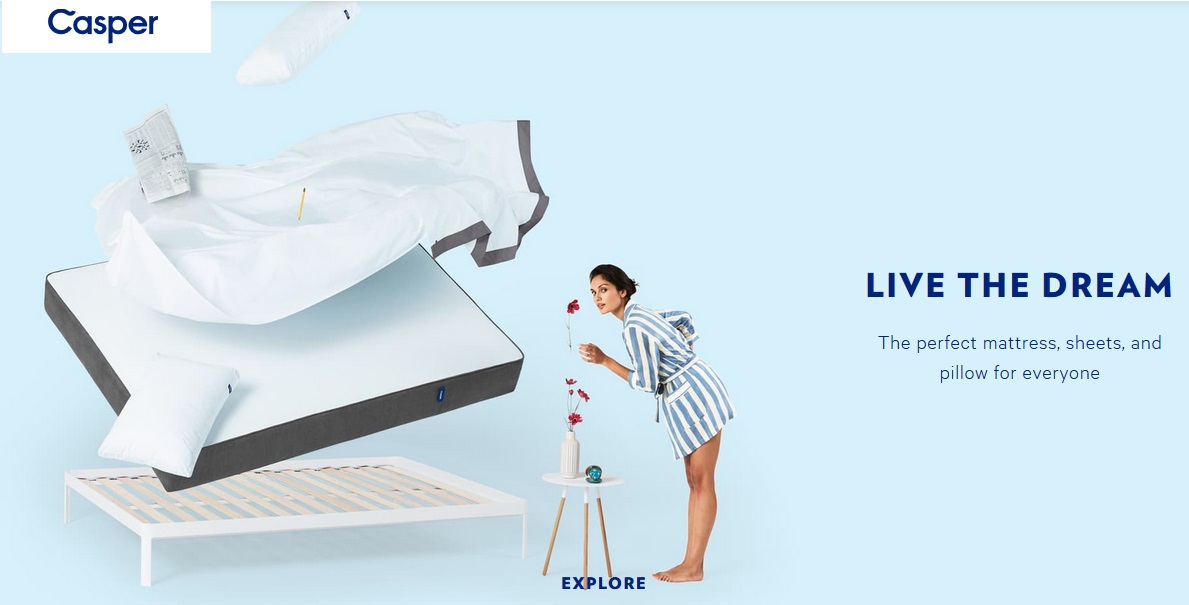Urethane Blog
Casper Profile
August 16, 2016
Casper Mattress is disrupting sleep

Casper Mattress has gotten a lot of attention – and, apparently, customers – with a unique retail model for the bedroom: The company designed, engineered, markets, sells, and delivers a single “perfect” mattress. It’s available in six sizes, at prices ranging from $500 to $950, and is compressed into a striped blue-and-white box for home delivery. Purchasers receive a 100-day free trial. If they don’t like the mattress, just call the company and they’ll come pick it up.
Casper launched in April, 2014, sold a million dollars’ worth of product in its first 28 days, and last year reached $100 million in sales. The mattress and company have won several innovation awards, received a respectable amount of above-average consumer satisfaction reviews, and raised $70 million in funding thus far from a list of investors that includes Tobey Maguire, Leonardo DiCaprio, Scooter Braun, Adam Levine and Ashton Kutcher.
The unpleasant shopping experience
Speaking at the ShopTalk retail conference this spring in Las Vegas, CEO Philip Krim said one of the things that makes Casper’s model work is “the unpleasantness” of the mattress shopping experience.
“One of the best things going for us is that everyone generally hates the experience of the corner mattress store – 70 beds on the floor, commissioned salespeople, a complicated matrix of firmnesses explained in words you’ve never heard,” Krim said. “And we always thought it was kind of a myth that by lying on a bed for 15 or 30 seconds in a store you’d find the right mattress, so we cut down the choice. We have one firmness.”
 Casper Mattress founder Philip Krim at ShopTalk 2016. |
No physical showroom also translates to low overhead. “We think we have a really unique advantage in this category specifically because of how large the margins are in bedding stores; we disintermediate the retail and pass that savings on to the consumer,” Krim said. “Our queen mattress costs $850, but it would be many multiples of that in a traditional retail setting.”
Getting physical with West Elm and nap stations
Brick and mortar isn’t completely out of the picture, though. Casper operates two showrooms – in Los Angeles and New York – and through an exclusive partnership that launched last month, shoppers can try out Casper’s “one perfect mattress” in West Elm’s stores, but all purchasing and ordering is done online (for home delivery in two to five days).
The company is also experimenting with pop-up shops and mobile nap stations. “Offline is a really meaningful way to interact with customers and to bring the brand to life, and certainly a mattress is a product a lot of people want to touch, feel, and lay on before they buy it,” Krim said.
There are also advantages from a production standpoint. “Unlike other manufacturers, we have a direct relationship with our customers so we’re able to improve the product based on real time feedback which traditional manufacturers in the space don’t really have.”
Taking a nontraditional view
Because of bedding’s unique purchase cycle, Krim said Casper’s marketing strategy is more about raising awareness and building relationships for the long term. “Usually about 90% of U.S. consumers are not in the market for a mattress – the industry average is that you replace a mattress on average every 7-8 years. We’re trying to create a memorable connection with people, across multiple mediums, so when you go out in the market you think about us … which is why we have fun with the ads and the creative.
“There is a way to drive significant value from customers over the long term if you can deliver a great experience… whether that’s consuming content on our editorial site at Vanwinkles.com (“Exploring the science, culture and curiosities of sleep”), or referring a friend to Casper, or buying another product like our new sheets and pillows.”
At the end of the night…
Also interesting are Krim’s thoughts on the potential opportunity that lies in taking a more nontraditional view of the category. “We want to be the world’s first global sleep brand, because sleep, as a category, doesn’t really exist. That doesn’t mean there aren’t companies out there thinking about the sleep ecosystem and thinking about how products work together, but at the end of the night, all you really care about is how you sleep.
“And so we think about it very holistically and design the sheets to work well with the mattress, and to work well with the pillows, because it optimizes the round of things we think are important to a great night’s sleep. You’ll have mattress manufacturers that are focused on mattresses, with sheets you generally have a licensed brand on top of a product brand that’s doing the design, and pillows are another really convoluted space, but there’s not really anyone out there who’s really solving advocacy around sleep. That’s our priority and what will continue to drive our product development pieces.”
Others also see opportunity in the business model, which has widened the playing field.
“Globally, over 40 companies have launched with a similar idea,” Krim said. “I think it’s a good thing in that it helps educate consumers that there is a better, smarter way to buy a mattress. Whether you learn about that from us or from someone else, that’s great, and even the big guys at this point have come in with a similar product offering. We see this as an emerging channel and we hope to continue to be the leaders.”
Internationally, the company just launched in Germany and is heading to the U.K. “Obviously sleep is a universal need, and buying a mattress is a universal pain point in the markets we looked at in Europe, so we think what we’ve done here in the states is something we can replicate over there. We see an opportunity that is too compelling to pass up.”
 Sign Up for Email Updates
Sign Up for Email Updates
 Everchem Updates Archive
Everchem Updates Archive
Recent News
April 24, 2024
April 24, 2024
April 18, 2024
April 18, 2024
April 17, 2024